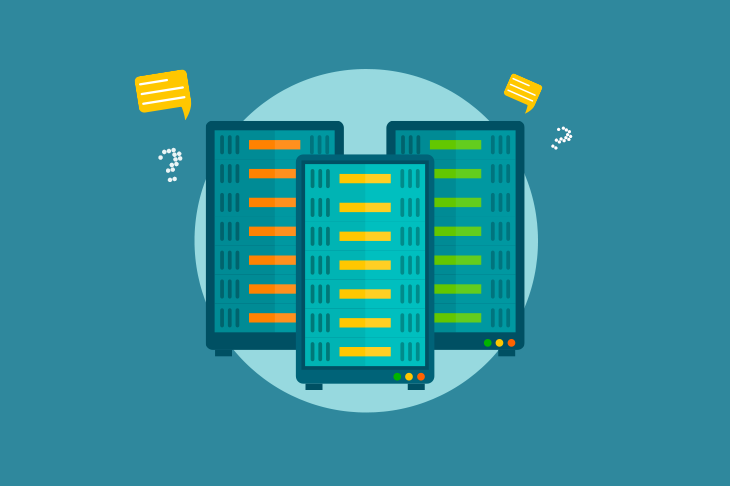There are more than 1.7 billion websites online right now. Some of these are probably hosted on a private server, however, the vast majority of them are using a web hosting service.
With so many websites out there, it’s no surprise that there is a significant number of web hosting providers to choose from. Since they’re all doing essentially the same job, often people go with a less expensive option.
Choosing the wrong hosting provider can have a damaging impact on your site and your business. Your website is your home on the Internet and it should not be built on a shaky foundation.
This article highlights the various ways in which a web hosting provider can hurt or help your website and will help you make a more informed decision.
How a web hosting provider can hurt your website
There are a number of ways that a poor web host can impact your site and your business. You may even have some of the following issues with your current provider without even realizing it.
1. Slow site speed
37% of visitors bounce when your site takes five seconds to load.
A single second delay in the loading of your page can have an impact on your overall conversion rate. In today’s fast-paced digital world, having a web page that takes too long to load will nudge your users to look elsewhere (mostly to your competition).
Moreover, a slow loading site can also have an impact on your search engine rankings. One of the reasons is because a user will not want to wait that long and Google will factor in their bounce rates. The faster your site loads, the higher it’s chances to rank well on search results.
2. Downtime
Your server being down for even a minute or two can have a significant impact on your business. For some companies, it could cost them a fortune. And if this happens on a regular basis then it could also affect your search result rankings.
3. Data loss
Building a website takes blood and sweat. There’s a lot of content and data on it that is impacting your business.
Imagine if all of that effort suddenly just disappears – if there’s a glitch at your web host’s datacenter, or your files accidentally get deleted because of a bug. This could result in a major loss and might require you to rebuild your website from scratch. The damage that this could do to your business is substantial.
How a web hosting provider can help your website
A good web hosting provider offers features that help your business, not hinder it. Here are some of the things they should be offering.
1. A new name
Many web hosting services offer a free domain name as a part of their packages. This is a great opportunity for you to get a great domain name for your website. Papaki offers a free domain if you choose a Website Builder Professional plan or a Website Builder Eshop plan.
Choosing the right name can have a huge impact on your business. A cleverly chosen name can improve your SEO by being more likely to crop up during searches for your specific products. The domain extension of your domain name can be used to highlight what your business is about. For example:
- A business in the technology space can go for .tech
- An eCommerce or retail business can opt for .store
- An online business could go for .online or .site
- A creative professional or a business dealing with the outer space could choose .space
2. Fast speed
A one-second delay can result in a 7% drop in conversions. You can do all you can to optimize page speed, but if your web host is slow, no amount of tweaking is going to help you.
One of the key factors to look at when choosing a web host is the type of hard drives that are used in their servers. There are two options: Hard Disk Drives (HDD) and Solid State Drive (SSD).
Hard Disk Drives consist of a magnetically sensitive platter (or disk) that spins inside the drive, and an arm to read or write data to and from the disk. The problem with HDDs is that they are reliant on the physical moving parts. It puts a limit on their speed and also makes them prone to breaking down.
Solid State Drives use flash memory instead of a magnetic disk so there are no moving parts to break down or slow things up. It means SSDs can read and write at much faster rates than HDDs and are far less prone to breaking down. In fact, HDDs are around seven times more likely to fail than SSDs.
Therefore, look for web hosts that use SSDs in their servers. These hosts will be able to offer much faster speeds and will be less likely to have hard drive failures.
3. Server location
The location of your server also has an impact on your website performance. Ideally, you want your server to be located reasonably close to where the majority of the people who will use the site are based. Choosing a server located on the other side of the world isn’t a great idea.
The best web hosts will have systems in place to minimize the issues of server locations. These can include using a Content Delivery Network (CDN).
These networks store copies of static content from your site on servers all around the world. When someone accesses your website, the CDN delivers this content from whichever server is closest to them, speeding up response times.
Unless you’re only expecting people from one specific location to visit your site, then finding a web host that uses a CDN is always a wise choice.
4. Backup systems
Loss of data can be detrimental to your website. Therefore, it’s vital for you to choose a web host that has robust backup systems in place.
The best web hosts will offer backups as part of your package. Your data will be backed up at regular intervals ensuring that the copy of your site is always kept up to date.
It’s also important to check how long backup history is kept for. As your site changes, you may want to roll it back to an earlier version. Some hosts will only offer seven days of backup history; this may be enough for you but you can always explore options.
5. SSL certificates
There have been a number of large scale data breaches in the past that have exposed users’ emails, personal information, and more.
This has made internet users even more wary of keeping their data safe. That’s why your site needs an SSL certificate.
SSL stands for Secure Sockets Layer, which is a cryptographic protocol that encrypts data between your user’s computer and the server. A good web host will be able to provide SSL as part of the package.
Are you ready to change web host?
Finding a good website hosting provider is crucial to your website’s health and your business’s success. For you to realize your business goals, you need your site to be secured, active, and functioning at its optimum. The factors mentioned above can be a good starting point for your research and in helping you find a great website hosting provider. Check out the web hosting plans by Papaki and get started with as low as € 3.95 per month!






Join the Discussion